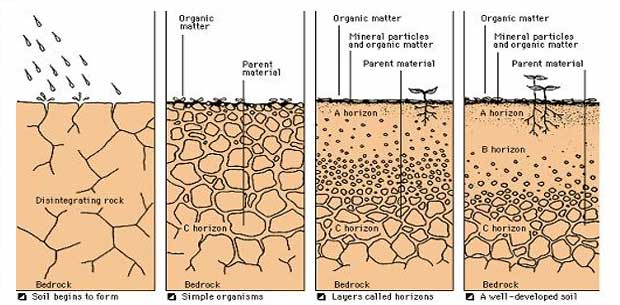
Soil is formed by the process of ‘weathering’ of rocks, that is, disintegration and decomposition of rocks and mineral at or near the earth’s surface through the actions of natural or mechanical and chemical agents into smaller grains.
Factors affecting formation of soil may be atmospheric, such as changes in temperatures and pressure; erosion and transportation by wind, water and glaciers; chemical action such as crystal growth, oxidation, hydration, carbonation and leaching by water, especially rainwater, with time.
So in general,formation of soil takes place by two methods:
- Physical disintegration of rocks
- Chemical decomposition of rocks
Physical disintegration
Physical disintegration or mechanical weathering of rocks occur due to the following physical processes:
- Temperature changes: Different minerals of a rock have different coefficients of thermal expansion. Unequal expansion and contraction of these minerals occur due to temperature changes. When the stresses induced due to such changes are repeated many times, the particles get detached from the rocks and the soil formation takes place.
- Wedging action of ice: Water in the pores and minute cracks of rocks gets frozen in very cold climates As the volume of ice formed is more than that of water, expansion occurs. Rocks get broken into pieces when large stresses develop in the cracks due to wedging action of the ice formed.
- Spreading of roots of plants: As the roots of trees and shrubs grow in the cracks and fissures of the rocks, forces act on the rock. The segments of the are forced apart and disintegration of rocks occurs.
- Abrasion: As water, wind and glaciers move over the surface of rock, abrasion and scouring takes place. It results in the formation of soil.
In all processes of physical integration, there is no change in the chemical composition. The soil formed has the properties of the parent rock. Course grained soils, such as gravel and sand, are formed by the process of physical disintegration.
Chemical disintegration
When chemical decomposition or chemical weathering of rocks takes place, original rock mineral are transformed into new minerals by chemical reactions. The soils formed do not have the properties of the parent rock. The following chemical processes generally occur in nature.
- Hydration: In hydration, water combines with the rock minerals and results in the formation of a new chemical compound. The chemical reaction causes a change in volume and decomposition of rock into small particles.
- Carbonation: It is a type of chemical decomposition in which carbon dioxide in the atmosphere combines with water to form carbonic acid. The carbonic acid reacts chemically with rocks and causes their decomposition.
- Oxidation: Oxidation occurs when oxygen ions combine with mineral in rocks. Oxidation results in decomposition of rocks. Oxidation of rocks is somewhat similar to rusting of steel.
- Solution: Some of the rocks minerals form a solution with water when they get dissolved in water. Chemical reaction takes place in the solution and the formation of soil takes place.
- Hydrolysis: It is a chemical process in which water gets dissociated into H+ and OH– ions. The hydrogen cations replace the metallic ions such as calcium, sodium and potassium in rock minerals and soils are formed with a new chemical decomposition.
Chemical decomposition of rocks results in formation of clay minerals. These clay minerals impart plastic properties of soil. Clayey soils are formed by chemical composition.

